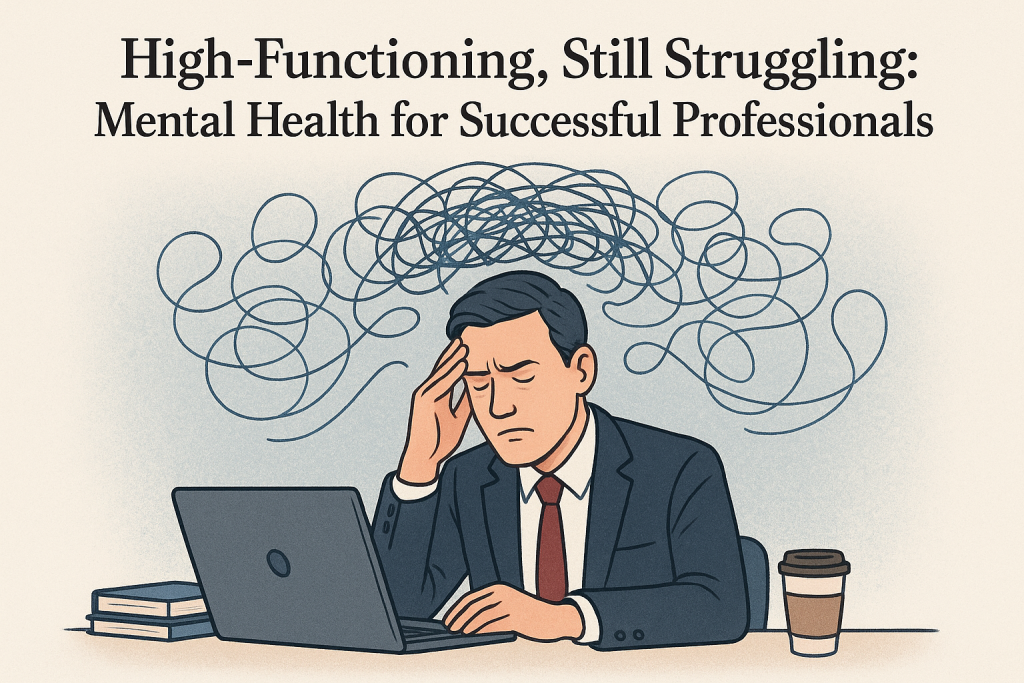In today’s fast-paced world, the pressure to succeed is higher than ever, especially for professionals striving to maintain high performance while managing mental health struggles. As of 2025, many successful individuals find themselves in the paradoxical position of being high-functioning yet still struggling with mental health challenges. This blog post aims to shed light on this issue, explore the barriers to accessing mental health care, and present innovative approaches that can help professionals balance their mental well-being with career demands.

Understanding the Hidden Struggles
Successful professionals often exhibit high-functioning mental health disorders, which means they can perform well at work while silently battling conditions like anxiety, depression, and burnout. According to a 2025 report by the World Health Organization (WHO), over 1 billion people globally live with mental health disorders, with anxiety and depression being prevalent among high-achievers who mask symptoms to maintain productivity. This situation is exacerbated by the stigma surrounding mental health, which often prevents individuals from seeking the help they need WHO, 2025.
Barriers to Accessing Mental Health Care
Accessing mental health care remains a significant challenge for professionals. The American Psychological Association (APA) highlights that cost and stigma are major obstacles, with 80% of people citing cost and over 60% citing shame as barriers to seeking care. Furthermore, a shortage of providers means that 60% of psychologists report having no openings for new patients, making it difficult for busy professionals to find timely help APA, 2024.
The 2024 State of the Behavioral Health Workforce report also emphasizes workforce shortages and maldistribution, particularly affecting high-stress roles. This means professionals may delay seeking help due to availability constraints, further worsening their condition HRSA, 2024.
The Impact of Burnout
Burnout is a critical issue affecting high-functioning professionals. It limits their capacity to maintain performance and exacerbates mental health struggles. The Health Resources and Services Administration (HRSA) report identifies burnout as a factor that limits behavioral health providers’ capacity, mirroring the challenges faced by professionals in other fields HRSA, 2024.
Innovative Solutions: Digital Mental Health Tools
Digital health technologies (DHTs) are gaining traction as a viable solution for professionals seeking flexible mental health care. A 2025 UK study found that mental health professionals have positive attitudes toward digital tools, which can help overcome barriers such as time constraints and stigma. These tools offer accessible, less traditional therapy formats that cater to the needs of busy professionals JMIR, 2025.
The Power of Peer Support
Incorporating peer support specialists—people with lived experience of mental illness—into mental health services can significantly improve engagement and outcomes. This model is particularly beneficial for professionals, as it reduces stigma and provides relatable guidance, helping them navigate mental health challenges while maintaining career success PMC, 2024.
Economic and Social Impact
Untreated mental health conditions among professionals lead to significant economic losses due to reduced productivity, absenteeism, and healthcare costs. According to the WHO’s 2025 data, mental health disorders are the second leading cause of long-term disability globally, affecting workforce participation and economic output WHO, 2025.
Recommendations for Improvement
Addressing mental health in successful professionals requires a multifaceted approach:
-
Increase Behavioral Health Workforce Capacity: Improve access by expanding the workforce and reducing maldistribution HRSA, 2024.
-
Expand Insurance Coverage: Lower financial barriers by reducing out-of-pocket costs HRSA, 2024.
-
Promote Digital Tools: Encourage the use of digital mental health tools and flexible care models tailored to professionals’ schedules and privacy concerns JMIR, 2025APA, 2024.
-
Foster Supportive Workplace Cultures: Reduce stigma and encourage help-seeking APA, 2024.
-
Integrate Peer Support: Enhance program relevance and effectiveness through peer support and lived experience integration PMC, 2024.
Conclusion
At Luxury Rehab, we understand the unique challenges faced by high-functioning professionals struggling with mental health issues. Our mission is to connect individuals with the best treatment options available, ensuring they receive the care they deserve. By implementing innovative solutions and breaking down barriers, we can create a supportive environment where professionals can thrive both mentally and professionally.
For more information on how Luxury Rehab can assist you in finding the right mental health support, contact one of our specialists today at 424-235-2009.
References
- State of the Behavioral Health Workforce November 2024 (HRSA)
- Mental Health Professionals’ Technology Usage and Attitudes (JMIR, 2025)
- The Future of Public Mental Health: Challenges and Opportunities (PMC, 2024)
- Trends & Pathways to Access Mental Health Care (APA Monitor, 2024)
- Over a Billion People Living with Mental Health Conditions (WHO, 2025)




